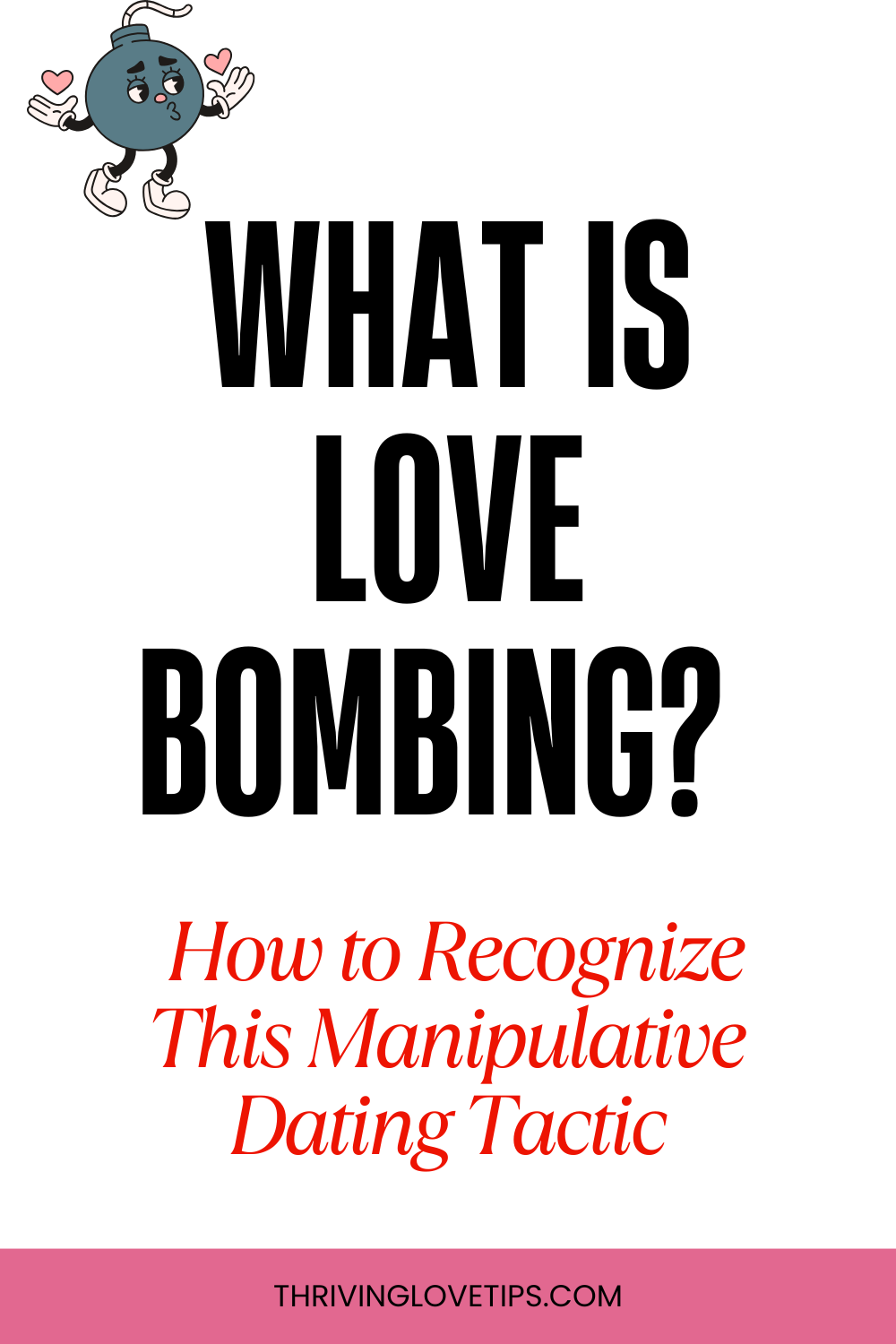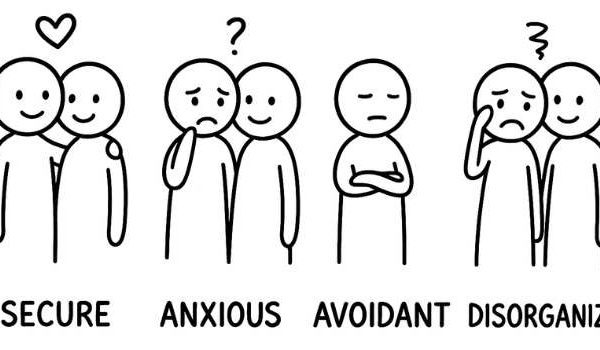You’ve just started dating someone new, and it feels like a fairy tale. They text you constantly, shower you with compliments, tell you you’re the most amazing person they’ve ever met, and declare that they’ve never felt this way about anyone before. Within days or weeks, they’re talking about your future together, introducing you to everyone they know, and making grand romantic gestures that sweep you off your feet. You feel special, chosen, and completely intoxicated by the intensity of their affection.
But something is unsettling underneath all this attention, even if you can’t quite name it. The pace feels overwhelming. The intensity seems disproportionate to how long you’ve actually known each other. And despite all the declarations of love, you’re starting to notice that this person doesn’t actually know you very well. They’re in love with an idea of you, not the real, complex person you actually are.
What you might be experiencing is called love bombing, a manipulative tactic where someone overwhelms you with excessive affection, attention, and declarations of love to gain control over you. It’s one of the most insidious forms of manipulation because it disguises itself as romance. In a culture that celebrates grand gestures and whirlwind romances, it can be incredibly difficult to distinguish between someone genuinely excited about you and someone who’s using intense affection as a weapon.
Understanding love bombing, how it works, why people do it, and how to recognize it can protect you from getting trapped in a relationship that starts like a dream but turns into a nightmare. Because what comes after the love bombing is often manipulation, control, and emotional abuse, once you’re sufficiently attached and vulnerable.

What Exactly Is Love Bombing?
Love bombing is a pattern of excessive affection, attention, and declarations of feelings designed to overwhelm someone’s judgment and create intense emotional attachment quickly. The term originally came from the cult recruitment world, where leaders would shower recruits with affection and validation to create rapid bonding and dependency.
In romantic relationships, love bombing typically happens at the very beginning, during what should be the getting-to-know-you phase. Instead of gradually building connection and trust, the love bomber floods you with intensity. They might text you dozens of times a day, demand constant communication, tell you they love you within days or weeks, talk about marriage and children before you’ve had a handful of dates, and make you feel like you’re the center of their universe.
Dr. Dale Archer, a psychiatrist and author, describes love bombing as “a deliberate attempt to influence another person with over-the-top displays of attention and affection.” The keyword here is deliberate. This isn’t someone who’s just enthusiastic or expressive. This is calculated behavior designed to create emotional dependency.
What makes love bombing particularly confusing is that it can feel amazing in the moment. Who doesn’t want to be adored, pursued, and made to feel special? Our culture romanticizes this kind of intensity through movies, books, and social media. We’re taught that passion should be overwhelming, that true love is all-consuming, that being swept off your feet is the goal.
But healthy love doesn’t overwhelm your judgment or rush you past important relationship stages. It doesn’t demand that you abandon your boundaries or your sense of self. Real love takes time to develop because it’s based on actually knowing someone, not on fantasy and projection.
The Psychology Behind Love Bombing
People love bomb for different reasons, and understanding the motivation can help you recognize when it’s happening. Some love bombers have personality disorders, particularly narcissistic personality disorder, where love bombing is part of a cycle of idealization and devaluation they use to control partners. They idealize you intensely at first, making you feel special and chosen, then gradually devalue and criticize you once you’re sufficiently attached.
Dr. Perpetua Neo, a psychologist who specializes in narcissistic abuse, explains that love bombing creates what she calls a “trauma bond.” “The intense high of the love bombing phase becomes a reference point. When things turn bad, victims keep trying to get back to that initial feeling, staying in relationships long past when they should leave.”
Other love bombers are driven by their own deep insecurity and abandonment fears. They rush intimacy because they’re terrified of being alone or being rejected. They’re trying to lock you down before you really get to know them and potentially decide they’re not what you want. This is less intentionally manipulative but still unhealthy because it’s about their needs, not a genuine connection.
Some people love bomb simply because they’re caught up in fantasy and projection. They’ve decided you’re “the one” based on minimal information, and they’re in love with their idea of who you are rather than the reality of you. When reality inevitably fails to match their fantasy, they’ll either lose interest or try to mold you into what they imagined.
Whatever the motivation, the effect is the same: you’re pulled into an intense connection before you have time to assess whether this person is actually good for you, whether you’re truly compatible, or whether their behavior is healthy. Your judgment gets clouded by the intensity of feeling and the flood of feel-good chemicals in your brain.
Classic Signs of Love Bombing
Learning to recognize love bombing can protect you from getting trapped in an unhealthy dynamic. While no single behavior guarantees someone is love bombing, a pattern of these signs together should raise serious red flags.
They declare intense feelings way too fast. Saying “I love you” within days or weeks, talking about your future together before you’ve had multiple dates, or acting like you’re already in a serious relationship when you barely know each other are all red flags. Real love takes time to develop because it’s based on truly knowing someone.
The compliments are constant but shallow. Love bombers often compliment you excessively, but pay attention to the content. Are they complimenting who you actually are, or are they making generic statements about your appearance or saying you’re perfect? Real appreciation is specific and based on actually knowing you.
They demand constant communication. Texting you all day, every day, getting upset if you don’t respond immediately, wanting to know where you are and what you’re doing constantly, these aren’t signs of devotion. They’re signs of someone who wants to monopolize your attention and prevent you from having space to think clearly.
They move at an uncomfortable pace. Wanting to be exclusive immediately, talking about moving in together or getting married way too soon, introducing you to their entire family after a few dates, these are attempts to rush commitment before you have time to really evaluate the relationship.
They shower you with gifts and grand gestures. While gifts aren’t inherently bad, love bombers often use expensive presents, elaborate surprises, and over-the-top gestures to create a sense of obligation and debt. You feel like you owe them something because they’ve “invested so much” in you.
They mirror you intensely. Love bombers often claim to share all your interests, values, and preferences, even when that seems statistically unlikely. They’re trying to seem like your perfect match by reflecting what you say you want. But this mirroring is superficial and often falls apart as you get to know them better.
They isolate you from others. They want all your time and attention, getting upset when you make plans with friends or family. They might criticize your other relationships or create drama when you try to maintain connections outside of them. This isolation makes you more dependent on them and removes outside perspectives that might point out red flags.
You feel overwhelmed or uncomfortable. Trust your gut. If the intensity feels like too much, if you feel pressured or rushed, if something feels off despite all the positive attention, those feelings are valid. Healthy relationships should make you feel excited but also comfortable and secure.
The Inevitable Devaluation Phase
What makes love bombing particularly damaging is what comes after. Once you’re sufficiently attached, invested, and vulnerable, the love bomber’s behavior typically shifts dramatically. This is sometimes called the devaluation phase, and the contrast is jarring.
The person who couldn’t get enough of you suddenly becomes critical. The constant attention turns into withdrawal and emotional distance. The declarations of love become accusations and complaints. They might become controlling, jealous, or abusive. They criticize things they previously claimed to love about you. They compare you unfavorably to others or to their idealized fantasy of who they thought you were.
This shift isn’t random. It happens because the love bombing was never really about you. It was about creating attachment and control. Once they feel secure that you’re hooked, they no longer need to maintain the facade. Or once reality doesn’t match their fantasy, they become disappointed and take it out on you.
Psychologist Dr. Ramani Durvasula explains that this cycle of idealization and devaluation is particularly common with narcissistic partners. “The love bombing creates such a powerful positive association that when things turn bad, victims blame themselves. They think if they could just be better, they could get back to that initial phase. But that phase was never real.”
Victims of love bombing often stay in these relationships far longer than they should because they’re chasing the high of that initial period. They remember how intense and wonderful it felt at first, and they keep hoping that person will come back. But that version never really existed. It was a performance designed to trap you.
How Love Bombing Differs from Genuine Enthusiasm
One of the most common questions about love bombing is: how do you tell the difference between someone genuinely excited about you and someone who’s love bombing? People who are falling in love often feel intense emotions and want to spend lots of time together.
The key differences come down to respect, pacing, and authenticity. Someone genuinely excited about you will still respect your boundaries. They’ll understand if you need space or time. They won’t get angry or manipulative when you can’t text back immediately or when you have other commitments.
Genuine interest includes curiosity about who you really are. They ask questions and actually listen to your answers. They remember details about your life. They want to know your flaws and complexities, not just worship an idealized version of you. Their compliments are specific and based on things they’ve learned about you.
A healthy new relationship has natural pacing. There’s excitement and growing closeness, but also a gradual building of trust and knowledge. You have time to evaluate compatibility, to see how this person handles stress or conflict, to notice if their words match their actions. You maintain your other relationships and interests rather than abandoning everything for this new person.
Most importantly, a genuine relationship feels comfortable in addition to exciting. You don’t feel overwhelmed, pressured, or like you’re on a runaway train. You feel secure enough to be yourself, including setting boundaries and expressing concerns. If expressing a boundary leads to guilt-tripping, anger, or punishment, that’s manipulation, not love.
What to Do If You’re Being Love Bombed
If you recognize love bombing in a current relationship, it’s important to take action to protect yourself. The first step is to slow things down. You can do this by being explicit about pacing: “I really like you, but this feels like it’s moving too fast for me. I need us to slow down and take time to really get to know each other.”
Pay attention to how they respond to this boundary. A healthy person will respect your need for a slower pace. A love bomber will likely get upset, try to convince you that you’re overreacting, guilt-trip you about not trusting the connection, or claim that you don’t care about them as much as they care about you.
Create and maintain space for yourself. Make sure you’re still seeing friends and family, pursuing your interests, and maintaining your life outside this relationship. Don’t let yourself become isolated. Outside perspectives are crucial for seeing the situation clearly.
Talk to trusted friends or family members about the relationship. Often, people outside the situation can see red flags more clearly than you can when you’re caught up in the intensity. Listen to their concerns, even if part of you wants to dismiss them.
Consider whether you want to continue the relationship at all. Love bombing is a serious red flag, especially when combined with other manipulative behaviors. You don’t owe anyone a relationship just because they’ve invested intense attention in you. If something feels wrong, it probably is.
If you decide to end things, be prepared for the love bomber to escalate their behavior. They might intensify the love bombing, trying to win you back with even more grand gestures. Or they might flip to anger, criticism, or even threats. Either response confirms that their behavior was manipulative rather than genuine.
Protecting Yourself Going Forward
Once you understand love bombing, you can be more aware of red flags in future relationships. This doesn’t mean becoming cynical or closed off to connection. It means approaching new relationships with healthy skepticism alongside openness.
Take your time in new relationships. Resist pressure to rush intimacy, commitment, or exclusivity. Insist on a pace that feels comfortable for you, regardless of how the other person feels. Anyone worth being with will respect your boundaries and your timeline.
Pay attention to whether someone is interested in who you really are or in an idealized version they’ve projected onto you. Do they ask questions and remember your answers? Do they seem genuinely curious about your thoughts, feelings, and experiences? Or do they mostly talk about their feelings for you without actually knowing you?
Maintain your life outside of new relationships. Don’t abandon friends, hobbies, or interests because someone new demands all your attention. A healthy partner will encourage you to have a full, balanced life rather than trying to become your entire world.
Trust your instincts. If something feels too intense, too fast, or somehow wrong despite all the positive attention, listen to that feeling. Your gut often recognizes manipulation before your conscious mind catches up.
The Bottom Line
Love bombing isn’t love. It’s manipulation disguised as romance, a tactic used to create dependency and control by overwhelming someone’s judgment with intensity and affection. Real love builds gradually, respects boundaries, and is based on truly knowing and accepting another person, not on fantasy and projection.
You deserve a relationship that makes you feel secure and respected, not overwhelmed and pressured. You deserve a partner who wants to know the real you, not someone who’s in love with an idea they’ve projected onto you. You deserve love that grows steadily rather than starting at an unsustainable intensity and then crashing.
If you’ve been love-bombed, know that it wasn’t your fault. These tactics work because they exploit normal human desires for connection and love. Being vulnerable to love bombing doesn’t make you weak or naive. It makes you human. What matters is recognizing the pattern, protecting yourself, and refusing to settle for manipulation when real, healthy love is possible.
Trust takes time to build. Compatibility takes time to assess. Love takes time to develop. Anyone who tries to rush you past these essential stages isn’t offering real love, no matter how intense their declarations feel. Slow down, trust your instincts, and hold out for the kind of love that’s built on genuine knowledge, respect, and authentic connection.




